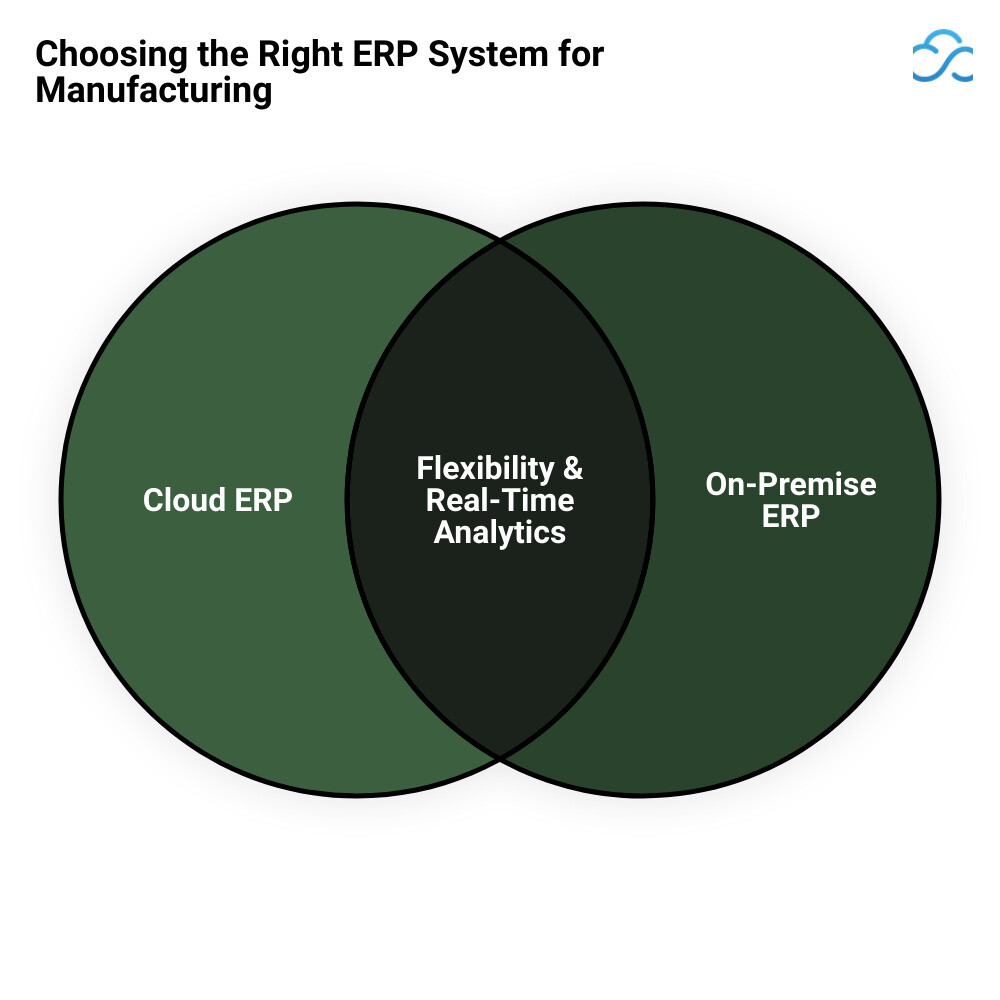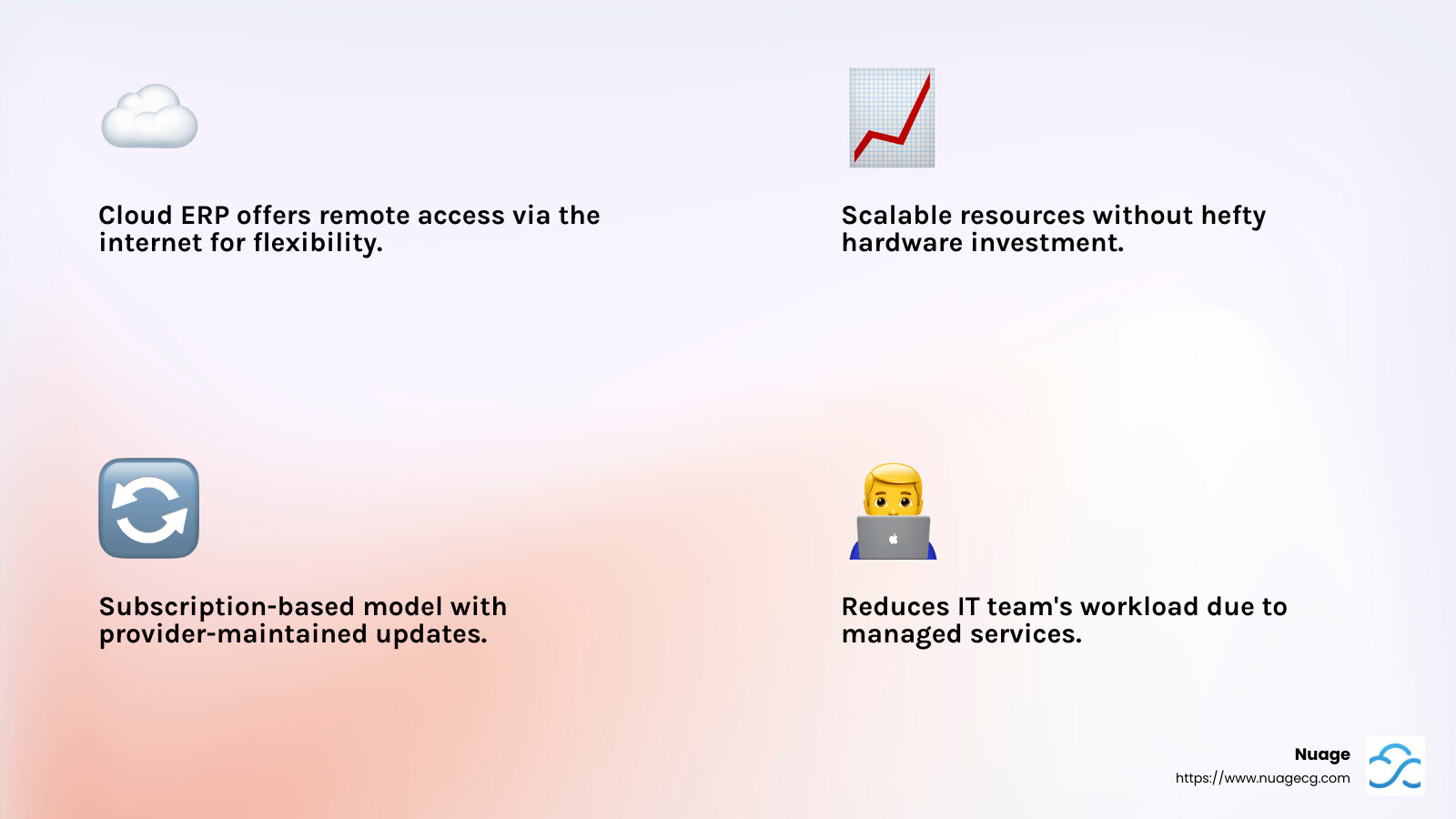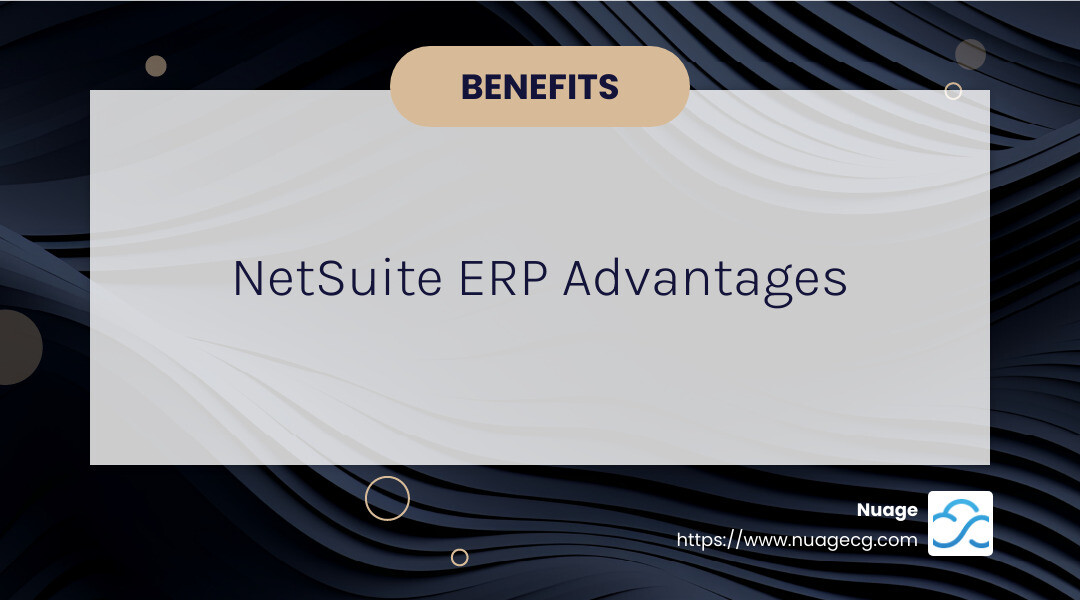ERP systems for manufacturing are crucial for modern businesses aiming to thrive in today’s competitive landscape. They empower manufacturers with powerful tools to streamline operations, reduce costs, and improve decision-making. Whether you’re running a small shop or a global enterprise, adopting the right ERP solution is essential for maximizing efficiency and profitability.
Key Points to Consider:
- Cloud vs. On-Premise: Choose between the flexibility of cloud-based ERPs or the control of on-premise systems.
- Customization & Integration: Look for ERP systems that adapt to your unique business processes and integrate seamlessly with existing tools.
- Real-Time Insights: Opt for systems providing real-time analytics to drive informed decision-making.
For further details, here’s a guide on NetSuite.
As manufacturers steer digital change, selecting the right ERP system marks the first step in a successful change journey. By embracing robust ERP systems, companies can position themselves for success amidst evolving industry demands.
I’m Louis Balla, your guide to understanding ERP systems for manufacturing. With over 15 years of experience, my expertise in streamlining processes with NetSuite is instrumental in guiding businesses through their digital change.

Understanding ERP Systems for Manufacturing
When it comes to ERP systems for manufacturing, understanding the different deployment options is key. Let’s break down the three main types: cloud ERP, on-premise ERP, and hybrid ERP.
Cloud ERP
Cloud ERP systems are hosted on remote servers and accessed via the internet. This model offers flexibility and scalability, allowing businesses to adjust resources as needed without a hefty upfront investment in hardware. Cloud ERPs are typically subscription-based, with maintenance and updates handled by the provider. This means less hassle for your IT team.

Example: NetSuite ERP—a leader in cloud solutions—provides manufacturers with tools to streamline operations and gain real-time insights. Learn more about its capabilities here.
On-Premise ERP
On-premise ERP systems are installed directly on a company’s servers. This gives businesses full control over their data and system customization. However, it requires a significant investment in IT infrastructure and resources for maintenance and updates.
Hybrid ERP
Hybrid ERP combines the best of both worlds, offering a mix of cloud and on-premise solutions. This model allows manufacturers to keep certain data in-house while leveraging cloud capabilities for other operations. It provides flexibility in migrating between models or integrating benefits not available in existing setups.
Why Choose Hybrid? It suits businesses that need to balance control and flexibility, adapting to changing business requirements without disrupting operations.
Making the Right Choice
Choosing between cloud, on-premise, and hybrid ERP depends on your business needs, budget, and IT capabilities. Consider factors like:
- Scalability: Do you anticipate growth that requires easy scaling?
- Control: How important is it to keep data and systems in-house?
- Cost: What are your budget constraints for initial setup and ongoing maintenance?
Understanding these options can help manufacturers make informed decisions, paving the way for improved efficiency and competitiveness in the changing industry landscape.
Top ERP Systems for Manufacturing
When it comes to ERP systems for manufacturing, NetSuite ERP stands out as a powerful solution. It offers unique features and capabilities tailored to the needs of modern manufacturers.
NetSuite ERP
NetSuite ERP is a leading cloud-based solution that empowers manufacturers with comprehensive tools for managing operations, finances, and supply chains. Its flexibility and scalability make it a popular choice for businesses looking to grow without being bogged down by IT infrastructure.
Key Features:
- Real-Time Analytics: NetSuite provides real-time insights into business performance, enabling swift decision-making.
- Mobile Access: Stay connected and manage operations from anywhere with mobile capabilities.
- Scalability: Easily scale your operations as your business grows, adapting to new market demands.
A case study highlighted by Nuage shows how NetSuite helped a production company streamline its order management and improve customer satisfaction. By integrating all parts of the supply chain, companies can make quick, data-driven decisions.

Find more about how NetSuite can transform your manufacturing operations here.
Benefits of ERP Systems in Manufacturing
Implementing ERP systems for manufacturing brings a host of benefits that can revolutionize how a business operates. Let’s explore some of the key advantages.
Automation
One of the standout benefits of ERP systems is their ability to automate repetitive tasks. This includes everything from data entry to routine documentation like quality control records. Automation reduces human error and frees up valuable time for employees to focus on more strategic tasks. For example, a manufacturing company might automate its inventory management, ensuring that stock levels are always optimized without manual intervention.
Efficiency
ERP systems streamline processes across the manufacturing floor. By integrating various functions—like production planning, scheduling, and inventory management—into a single system, businesses can operate more smoothly. This integration leads to fewer bottlenecks and faster production times.
Cost Savings
Cost savings are another significant benefit of ERP systems. By providing real-time visibility into operations, these systems help identify inefficiencies and areas where costs can be reduced. For example, a business might find that certain materials are consistently over-ordered, leading to waste. With this insight, they can adjust their purchasing strategy and save money. Additionally, cloud-based solutions like NetSuite ERP often come with lower upfront costs compared to traditional on-premise systems.
Real-Time Analytics
Real-time analytics is a game-changer for decision-making. ERP systems provide valuable insights into every aspect of the business, from production metrics to financial performance. This data allows managers to make informed decisions quickly. NetSuite ERP is renowned for its real-time analytics capabilities, empowering manufacturers to respond swiftly to changes in demand or supply chain disruptions.
In summary, ERP systems offer automation, improved efficiency, cost savings, and real-time analytics—benefits that are crucial for manufacturers aiming to stay competitive in today’s market. By leveraging these tools, businesses can optimize their operations and improve their overall performance.
Key Features of Manufacturing ERP Systems
When it comes to ERP systems for manufacturing, there are several key features that can transform your operations. These features help streamline processes, improve accuracy, and improve overall efficiency. Let’s explore the essential components that make manufacturing ERPs indispensable.
Production Planning
Production planning is a core feature of any manufacturing ERP. It ensures that all resources—like materials, labor, and machinery—are used effectively to meet production goals. With advanced planning tools, manufacturers can create detailed schedules, allocate resources, and anticipate potential bottlenecks. This leads to optimized production cycles and reduced downtime.
Inventory Management
Effective inventory management is crucial for maintaining the right balance of materials and finished goods. An ERP system provides real-time visibility into inventory levels, helping manufacturers track raw materials, work-in-progress, and finished products. Automated alerts can notify managers when stock levels are low, ensuring timely reordering. This minimizes the risk of stockouts and overstocking, which can be costly. NetSuite ERP excels in providing comprehensive inventory management solutions that keep operations running smoothly.
Quality Control
Quality control is essential for maintaining product standards and customer satisfaction. Manufacturing ERPs integrate quality control processes into the production workflow, allowing for real-time monitoring and documentation. This integration helps identify defects or issues early in the production process, reducing waste and ensuring consistent quality.
Financial Management
Financial management within an ERP system consolidates all financial operations, from accounting and budgeting to financial reporting. This feature provides manufacturers with a clear picture of their financial health, enabling better financial planning and decision-making. By automating financial processes, businesses can reduce errors and improve compliance. NetSuite ERP is known for its powerful financial management capabilities, offering tools that simplify complex financial tasks.
Incorporating these key features into your manufacturing operations can lead to significant improvements in efficiency, quality, and financial performance. By leveraging the capabilities of ERP systems, manufacturers can streamline their processes and remain competitive in a rapidly changing industry.
Frequently Asked Questions about ERP Systems for Manufacturing
What is an ERP system in manufacturing?
An ERP system in manufacturing is a comprehensive software solution designed to manage and integrate core manufacturing processes. It encompasses two primary types: discrete manufacturing and process manufacturing.
Discrete manufacturing deals with the production of distinct items like cars, appliances, and electronics. These items are typically assembled from individual components, and the process is easily tracked and measured.
Process manufacturing, on the other hand, involves the production of goods through formulas or recipes, such as food, beverages, and chemicals. This type of manufacturing is less about assembling parts and more about mixing ingredients.
ERP systems for manufacturing help streamline operations by integrating production planning, inventory management, quality control, and financial management into a single platform. This integration enables manufacturers to maintain efficiency and quality while reducing costs.
Which ERP software is used for the manufacturing industry?
In the manufacturing industry, the choice of ERP software often comes down to the deployment model: cloud ERP, on-premise ERP, or hybrid ERP.
- Cloud ERP: This model is hosted on the vendor’s servers and accessed via the internet. It offers benefits such as lower upfront costs, automatic updates, and scalability. Cloud-based systems like NetSuite ERP are popular for their flexibility and ease of access.
- On-premise ERP: This traditional model involves installing the ERP software on the company’s own servers. It offers greater control over data and customization but requires significant IT resources for maintenance. Manufacturers who prefer to keep data in-house might opt for this model.
- Hybrid ERP: Combining the best of both worlds, hybrid ERP solutions allow manufacturers to leverage cloud capabilities while maintaining some on-premise infrastructure. This model offers flexibility and can be custom to the specific needs of a business.
What are the three main ERP systems?
When discussing the three main components of ERP systems, we focus on financials, business intelligence, and supply chain management.
- Financials: This component is crucial for managing a company’s financial operations, including accounting, budgeting, and financial reporting. It provides real-time insights into financial health, helping manufacturers make informed decisions. NetSuite ERP is renowned for its robust financial management tools.
- Business Intelligence (BI): BI tools within an ERP system help manufacturers analyze data and derive actionable insights. These tools support decision-making by providing real-time analytics and reporting, allowing businesses to identify trends and optimize operations.
- Supply Chain Management: This component ensures efficient management of the supply chain, from procurement to production and delivery. It helps manufacturers maintain a seamless flow of materials and products, reducing delays and improving customer satisfaction.
By understanding these key aspects, manufacturers can choose the right ERP system that aligns with their specific needs and improves their operational efficiency.
Conclusion
As we wrap up our exploration of ERP systems for manufacturing, it’s clear that these solutions are integral to modernizing operations and driving digital change. At Nuage, we understand that adopting new technology is more than just a software upgrade—it’s a change journey. With over 20 years of experience, we have become a trusted partner in guiding businesses through the complexities of ERP implementation and support.
Our collaboration with industry leaders like NetSuite ERP allows us to offer custom solutions that align with your business goals. We prioritize understanding your unique challenges and delivering custom strategies that foster growth and efficiency.
In today’s manufacturing landscape, having a reliable partner is crucial. Our expertise ensures that your ERP systems not only meet current demands but also adapt to future needs. Whether you’re looking to streamline production, improve inventory management, or gain real-time analytics, we are here to support your digital change journey.
Additional Resources
- Explore more about NetSuite ERP to find how it can improve your financial and business management capabilities.
Stay ahead of the competition with Nuage as your partner in navigating the evolving world of ERP systems. Let’s transform your manufacturing processes together.
